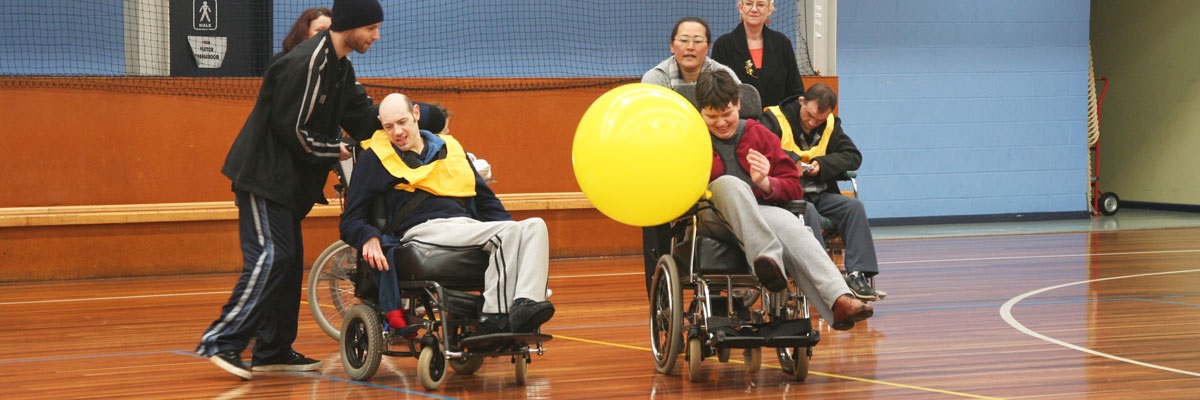How Disability Support encourages independence through smart care planning
How Disability Support encourages independence through smart care planning
Blog Article
The Essential Link In Between Impairment Solutions and Effective Home Care Solutions
The connection between impairment services and home treatment options is crucial for boosting the lives of individuals with impairments. Disability services provide essential resources and support. Home care remedies provide customized support in acquainted settings. This partnership promotes self-reliance and social inclusion. Yet, the specifics of how these elements interact stay complex. Recognizing this connection can disclose new insights into boosting care for those in demand. What are the implications for caretakers and individuals alike?
Recognizing Special Needs Solutions: A Review
While numerous people might not completely realize the intricacies of disability services, recognizing their scope and significance is necessary for fostering inclusivity. Special needs solutions encompass a large range of support mechanisms created to aid individuals with physical, intellectual, or developmental impairments. These solutions aim to boost the top quality of life, advertising freedom and participation in society. They include curricula, work support, transportation assistance, and healthcare services tailored to specific needs.Furthermore, these services commonly entail partnership amongst various stakeholders, including government companies, charitable organizations, and community groups. This collective method guarantees that individuals obtain detailed assistance that resolves their one-of-a-kind obstacles. Recognition of special needs solutions is essential, as it encourages societal approval and the removal of stigma. By recognizing the importance of these services, areas can develop a more inclusive atmosphere, ultimately benefiting everyone and promoting equal possibilities for people with specials needs.
The Role of Home Treatment in Supporting People With Disabilities
Home treatment plays a vital function in improving the lives of people with specials needs by offering personalized support in acquainted settings. This type of treatment enables individuals to preserve their freedom while receiving assistance customized to their specific demands. Caregivers not only provide physical support, such as aid with day-to-day activities like showering and meal prep work, but likewise provide psychological encouragement and companionship.In addition to sensible aid, home treatment services help with social interaction, which is fundamental for psychological health. By engaging people in community tasks or promoting communication with family members and close friends, caregivers aid battle sensations of isolation. Home treatment also relieves the problem on member of the family, permitting them to concentrate on their own responsibilities while ensuring their enjoyed ones receive appropriate treatment (Disability Support). Inevitably, home care works as a substantial support group, empowering people with disabilities to prosper within their very own homes
Tailored Treatment Plans: Satisfying Unique Requirements
Customized care plans are essential for properly dealing with the special demands of people with handicaps. These strategies are created to provide customized assistance, thinking about the details difficulties and choices of each individual. By performing thorough analyses, treatment providers can identify strengths and areas needing help, ensuring that care is both effective.incorporating and relevant input from the individual and their family participants fosters a collaborative approach, enhancing engagement and fulfillment. Tailored care strategies might consist of different solutions, such as physical therapy, occupational treatment, and individual treatment support, all focused on advertising general wellness. Regular evaluations of these care plans are very important to adjust to transforming requirements and situations. This adaptability permits timely adjustments, making certain that individuals receive optimal support throughout their lives. Inevitably, customized treatment plans function as a foundation for delivering top quality care that values the self-respect and individuality of everyone.
Enhancing Independence With Handicap Solutions
Encouraging people with handicaps to accomplish higher freedom is a primary goal of disability solutions. These solutions offer necessary resources that help with self-sufficiency and enhance the lifestyle for those impacted. By providing individualized assistance, such as movement training, adaptive technologies, and life skills development, special needs services allow people to browse daily challenges much more effectively.Access to community-based programs and social incorporation campaigns better promotes freedom. Through these possibilities, individuals can take part in meaningful tasks, develop relationships, and establish a feeling of belonging. Additionally, information and reference solutions assist connect people to crucial resources, guaranteeing they receive the support required to thrive.Ultimately, boosting self-reliance with impairment solutions not just advantages people but additionally advertises a more inclusive culture. By breaking down barriers and motivating self-advocacy, these solutions empower individuals to lead meeting lives, adding to their areas in useful ways.
The Relevance of Training for Caregivers
Educating for caretakers is crucial for creating necessary abilities that directly affect the high quality of treatment offered to people with handicaps. By improving their understanding and abilities, caregivers can promote thoughtful partnerships that advertise depend on and understanding. This focus on training not only enhances solution distribution but additionally enriches the general caregiving experience.
Important Ability Advancement
Ability development is important for caretakers in the disability services and home care markets. Appropriate training gears up caregivers with the basic abilities needed to offer efficient assistance and aid to individuals with impairments. This includes understanding particular medical requirements, effective interaction techniques, and the capability to reply to numerous behavioral challenges. In addition, ability advancement enhances caretakers' capacity to cultivate self-reliance in clients, guaranteeing they can do daily tasks with dignity. Recurring training likewise promotes confidence and work satisfaction amongst caretakers, reducing turnover rates in the market. By prioritizing ability growth, organizations can assure that caregivers are well-prepared to fulfill the diverse requirements of those they offer, inevitably contributing to a much more thoughtful and efficient treatment environment.
Enhancing Treatment Top Quality
Elevating the top quality of take care of people with disabilities rests on the extensive training given to caretakers. Well-trained caregivers have essential expertise and skills required to address the unique demands of their customers effectively. Comprehensive training programs include numerous facets, such as understanding disability-specific difficulties, effective communication approaches, and safety protocols. Furthermore, ongoing education and learning warranties that caretakers remain updated on finest methods and arising modern technologies in home treatment - Disability Services. This commitment to training not only enhances service delivery but also fosters a sense of self-confidence among caregivers, which equates into improved care top quality. Ultimately, investing in caregiver training is vital for producing a setting where people with handicaps obtain the conscientious, considerate, and effective care they are worthy of
Building Compassionate Relationships

Developing a Supportive Setting in your home

Accessible Home Adjustments
Numerous individuals with disabilities encounter significant challenges in navigating their home atmospheres, making available home alterations crucial for promoting independence and safety and security. These adjustments can include mounting ramps, broadening entrances, and producing barrier-free bathrooms, therefore making it possible for simpler accessibility throughout the home. Furthermore, including grab bars and non-slip surfaces can substantially reduce the threat of falls, promoting a much more secure space. Lifts or stairlifts may likewise be necessary for multi-level homes, ensuring that all locations are reachable. By implementing these adjustments, caregivers can assist develop an atmosphere where people can navigate their rooms with confidence. Eventually, accessible home adjustments play a crucial role in improving the quality of life for those with impairments, permitting them to thrive in their own homes.
Personalized Treatment Program
Easily accessible home modifications prepared for a setting where individuals with disabilities can thrive, but tailored support is similarly essential. Customized care plans play a vital duty in resolving the one-of-a-kind demands of each person. These strategies are established through extensive evaluations that think about medical requirements, personal choices, and day-to-day routines. By concentrating on specific toughness and difficulties, caregivers can create techniques that foster independence and boost lifestyle. Routine assessments guarantee that care plans remain efficient and relevant, permitting modifications as demands change with time. This personalized strategy not only enhances the experience of those obtaining treatment however likewise promotes a sense of autonomy, eventually contributing to a much more supportive and equipping home atmosphere.
Household Participation Techniques
Family participation is vital in establishing an encouraging environment for people with specials needs at home. Involving family participants in care methods fosters a feeling of belonging and safety and security. Reliable communication is crucial; regular family members conferences can help with conversations about the person's choices and needs. Furthermore, educating family participants about the particular handicaps can boost understanding and compassion, resulting in much better assistance. Motivating participation in daily activities not just reinforces relationships however additionally promotes freedom for the individual. It is crucial for family members to collaborate with special needs company to develop natural care plans. By actively including member of the family, a nurturing environment is grown, inevitably boosting the quality of life for those with impairments.
Determining the Influence of Integrated Care Solutions
The effectiveness of integrated care services can considerably affect the high quality of life this content for people with handicaps. Gauging this impact requires a multifaceted approach that incorporates numerous metrics, consisting of wellness end results, customer complete satisfaction, and cost-effectiveness. Health and wellness results can be examined by tracking enhancements in wheelchair, psychological wellness, and overall health, providing tangible proof of treatment efficiency. Individual complete satisfaction surveys can record the experiences of people and their households, offering insights into the perceived quality of care obtained. Furthermore, examining cost-effectiveness assists to ensure that resources are being utilized successfully, enabling for sustainable treatment versions. By utilizing these measurement strategies, stakeholders can obtain a thorough understanding of just how integrated care remedies favorably impact people with handicaps. Eventually, this data not only aids in refining existing services yet likewise informs future plan decisions, making certain that treatment remains straightened with the progressing demands of this population.
Frequently Asked Concerns
How Can Family Members Advocate for Better Disability Solutions and Home Treatment?
Family members can promote for boosted impairment solutions and home care by looking into sources, attending neighborhood conferences, engaging with neighborhood representatives, sharing personal experiences, creating support groups, and teaming up with organizations devoted to disability legal rights and care enhancements.
What Are Common False Impressions Regarding Disability Providers and Home Care?

Are There Financial Support Options for Handicap Solutions and Home Treatment?
Financial help options for special needs services and home care consist of federal government programs, grants, and insurance policy protection. Resources vary by place, calling for individuals to research study neighborhood agencies and organizations that give financial backing tailored to their requirements.
Just How Can Technology Improve Home Look After People With Disabilities?
Technology can boost home care for individuals with handicaps by offering assistive gadgets, telehealth solutions, and checking systems. These innovations enhance access, advertise independence, and allow caregivers to respond much more properly to the demands of their clients.
What Resources Are Available for Caregivers of Individuals With Disabilities?
Different resources exist for caregivers of individuals with specials needs, consisting of federal government aid programs, support groups, educational workshops, online forums, and specialized training. These resources aim to enhance caregivers' abilities and provide emotional and functional support. The partnership between disability solutions and home care solutions is important for enhancing the lives of individuals with disabilities. Home care additionally alleviates the burden on household participants, permitting them to concentrate on their very own obligations while ensuring their loved ones receive ample treatment. By carrying out complete evaluations, care companies can identify areas and strengths calling for help, making sure that care is both pertinent and effective.Incorporating input from the private and their household participants promotes a collaborative strategy, improving engagement and complete satisfaction. Customized treatment plans might consist of different services, such as physical therapy, occupational treatment, and personal treatment support, all intended at advertising overall wellness. Technology can boost home care for people with specials needs by offering assistive tools, telehealth services, and monitoring systems.
Report this page